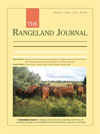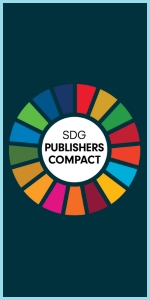The Rangeland Journal
Volume 38
Number 3 2016
Climate Clever Beef: Practical Measures to Improve Business Performance and Reduce Greenhouse Gas Emissions in Northern Australia
Options for the northern Australian beef industry to reduce greenhouse gas emissions and engage in the carbon economy without compromising beef production and profitability were examined. Management strategies to reduce methane from livestock, improve emissions intensity and sequester carbon in soil and vegetation were identified and evaluated using a participatory action research model to achieve producer practice change. Carbon farming opportunities were identified that could improve both business performance and emissions intensity, however there are significant trade-offs and risks which need to be considered.
Potential relationships between land condition indicators and soil organic carbon (SOC) stocks were investigated in the grazing lands of northern Australia. The results indicated there was only a moderate relationship between some indicators and SOC stock, modulated by soil type. The magnitude and direction of the relationships varied at different spatial scales, soil depth increment and soil type, suggesting that caution is required when considering the implementation of SOC sequestration projects.
This paper examines the complexity of 18 extensive beef businesses in the northern Gulf region of Queensland, Australia. Poor profitability, low equity and seasonal pressures drive decision making that impact on land management and environmental outcomes. In closing, the paper proposes that natural resource management programs must be delivered within a whole-of-business framework to positively influence stocking rate and grazing management practices.
Grazing property case study data were used to investigate potential greenhouse gas emission intensity reductions and productivity gains for cattle breeding enterprises grazing native pastures in northern Australia. Strategies to increase the fertility of breeding herds and earlier joining of heifers as yearlings were studied on two properties which had different rainfall, country types, and property sizes, at Longreach and Boulia in western Queensland. The gains achieved suggest similar improvements can be made across the Mitchell Grass Downs bioregion.
This paper presents a rare published analysis of changes in production, economic, greenhouse gas emissions and land condition performance for a commercial livestock business. The improvements that have been realised over the past 32 years are compared with alternative approaches to pastoral management. The paper concludes that cost-effective investment to concurrently increase herd size and livestock productivity per head, in conjunction with safe stocking rate management, is a proven path to economic and environmental sustainability in the north Australian beef industry.
Through the Australian government’s Emission Reduction Fund beef producers can receive income for storing carbon in woody regrowth. Bio-economic modelling determined there was a relatively low opportunity cost for a beef grazing enterprise in central Queensland of retaining woody regrowth for carbon storage. Although uncertainty remains around the price received for carbon, this study demonstrated a conservatively stocked breeding operation can achieve positive production, environmental and economic outcomes, including increases in the net carbon stock.




